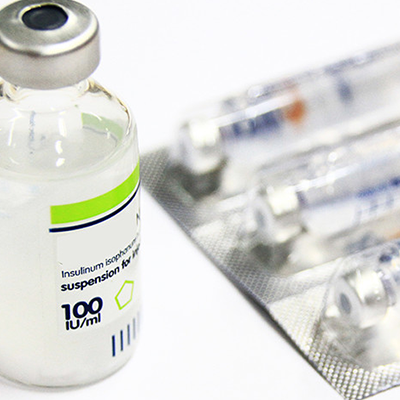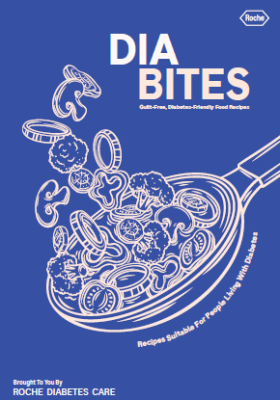Building a Habit: Regular Diabetes Management with ACCU-CHEK
At Accu-Chek, we firmly believe that cultivating a habit of regular sugar testing is the cornerstone of achieving better health outcomes for individuals living with diabetes. In this blog, we will guide you on how to establish a routine of consistent and structured testing with Accu-Chek, emphasizing the significance of this practice in attaining improved health and well-being. Embrace Accu-Chek: Your Partner in Diabetes Management Accu-Chek has been a trusted companion for millions of individuals...
Read MoreEating Healthy with Diabetes
You don’t have to sacrifice your target blood sugar levels to enjoy some of your favorite foods. Here’s how to eat healthy with #diabetes, whether you’re cooking at home, or eating in a restaurant. Carbohydrates and your blood sugar Carbohydrates are sugars. They break down in the body creating glucose, a main source of energy. Counting the carbs you eat at every meal and pairing them with the correct dosage of insulin can keep your blood sugar level closer to normal range.1 It also allows you to eat a wider variety of foods. In fact, your diet can accommodate any food in...
Read MoreCreating a Circle of Support
No one can go it alone. Whether you have diabetes or you’re a caregiver, it’s important to have a few options for emotional support. Knowing who to turn to with specific questions will make life easier. Find other people with diabetes Few things are more comforting than talking with someone who understands you when you have diabetes, or if you are facing a type 1 or type 2 diagnosis. If you don’t already have a friend or family member with diabetes who can fill this role, seek out a diabetes support group near you. What have you got to lose? If you don’t like one group, look for...
Read MorePreparing for Pregnancy
Preparing for pregnancy—good reasons to start today Let's think into the future. Imagine sitting in a rocking chair playing with ten brand-new, tiny toes. That's the image you can remember every time you check your blood glucose, visit your doctor or say no to a glass of wine. And it's absolutely worth it. Not ready for parenthood yet? Here's what you can do now. There are several things you can do to prepare for pregnancy well before you're ready to conceive. Read about it—just not too much. When you understand the risks, you...
Read MoreWhat is A1C?
Your A1C number Consider your A1C number (also known as HbA1c or glycated hemoglobin) as a snapshot of your blood glucose levels over several months. Over time, glucose naturally attaches itself to your blood cells. When this happens, the cell is considered “glycated.” The more glucose in your blood, the more glycated A1C cells you have. What’s an optimal A1C number? The recommended A1C target for a person with diabetes is 7% or lower—some people remember this figure as “lucky number 7.” However, while your A1C number gives you and your doctor an idea of how your diabetes is being...
Read MoreInsulin Injections: Breaking Down The Barrier
If insulin injections are part of your daily life, you know how essential they are to managing your diabetes and preventing complications. You also know that following your injection schedule is crucial. If your body doesn’t get enough insulin over the long term, you risk developing serious problems with your eyes, heart, nerves and kidneys. Getting too much insulin could lead to hypoglycemia—extreme cases of which can cause diabetic coma. Despite all this, according to a study conducted in the US, over half of people with insulin-dependent diabetes have deliberately skipped injections at some point. Around 20% do it...
Read MoreAt the heart of the matter
Everyone thinks of February as the month of Valentine’s Day, but let’s not forget it’s also Heart Month! A few quick facts Half of the people living with diabetes are unaware of their risk of heart disease. Adults with diabetes are two to four times more likely to suffer from heart disease or a stroke compared to non-diabetic adults. Two-thirds of adults living with diabetes have high blood pressure, which is a risk factor for heart disease, heart attacks and strokes. When blood sugar is too high, it can damage blood vessels and...
Read MoreHow to Talk to Your Doctor
How to Talk to Your Doctor Whether you’ve been living with diabetes for years or you’re newly diagnosed, communicating with your healthcare team is one of the best things you can do. If you’re nervous about opening up to your doctor or pharmacist, there are some good reasons to conquer these fears. Less communication leads to measurable increases in your stress, anxiety, and possible depression. It also leads, inevitably, to less frequent and less successful diabetes management.1 Since communicating with your healthcare providers is proven to be good for your health, here are some...
Read MorePages
Eating Healthy with Diabetes
You don’t have to sacrifice your target blood sugar levels to enjoy some of your favorite foods. Here’s how to eat healthy with #diabetes, whether you’re cooking at home, or eating in a restaurant. Carbohydrates and your blood sugar Carbohydrates are sugars. They break down in the body creating glucose, a main source of energy. Counting the carbs you eat at every meal and pairing them with the correct dosage of insulin can keep your blood sugar level closer to normal range.1 It also allows you to eat a wider variety of foods. In fact, your diet can accommodate any food in...
Read MoreCreating a Circle of Support
No one can go it alone. Whether you have diabetes or you’re a caregiver, it’s important to have a few options for emotional support. Knowing who to turn to with specific questions will make life easier. Find other people with diabetes Few things are more comforting than talking with someone who understands you when you have diabetes, or if you are facing a type 1 or type 2 diagnosis. If you don’t already have a friend or family member with diabetes who can fill this role, seek out a diabetes support group near you. What have you got to lose? If you don’t like one group, look for...
Read MorePreparing for Pregnancy
Preparing for pregnancy—good reasons to start today Let's think into the future. Imagine sitting in a rocking chair playing with ten brand-new, tiny toes. That's the image you can remember every time you check your blood glucose, visit your doctor or say no to a glass of wine. And it's absolutely worth it. Not ready for parenthood yet? Here's what you can do now. There are several things you can do to prepare for pregnancy well before you're ready to conceive. Read about it—just not too much. When you understand the risks, you...
Read MoreWhat is A1C?
Your A1C number Consider your A1C number (also known as HbA1c or glycated hemoglobin) as a snapshot of your blood glucose levels over several months. Over time, glucose naturally attaches itself to your blood cells. When this happens, the cell is considered “glycated.” The more glucose in your blood, the more glycated A1C cells you have. What’s an optimal A1C number? The recommended A1C target for a person with diabetes is 7% or lower—some people remember this figure as “lucky number 7.” However, while your A1C number gives you and your doctor an idea of how your diabetes is being...
Read MoreInsulin Injections: Breaking Down The Barrier
If insulin injections are part of your daily life, you know how essential they are to managing your diabetes and preventing complications. You also know that following your injection schedule is crucial. If your body doesn’t get enough insulin over the long term, you risk developing serious problems with your eyes, heart, nerves and kidneys. Getting too much insulin could lead to hypoglycemia—extreme cases of which can cause diabetic coma. Despite all this, according to a study conducted in the US, over half of people with insulin-dependent diabetes have deliberately skipped injections at some point. Around 20% do it...
Read MoreAt the heart of the matter
Everyone thinks of February as the month of Valentine’s Day, but let’s not forget it’s also Heart Month! A few quick facts Half of the people living with diabetes are unaware of their risk of heart disease. Adults with diabetes are two to four times more likely to suffer from heart disease or a stroke compared to non-diabetic adults. Two-thirds of adults living with diabetes have high blood pressure, which is a risk factor for heart disease, heart attacks and strokes. When blood sugar is too high, it can damage blood vessels and...
Read MoreHow to Talk to Your Doctor
How to Talk to Your Doctor Whether you’ve been living with diabetes for years or you’re newly diagnosed, communicating with your healthcare team is one of the best things you can do. If you’re nervous about opening up to your doctor or pharmacist, there are some good reasons to conquer these fears. Less communication leads to measurable increases in your stress, anxiety, and possible depression. It also leads, inevitably, to less frequent and less successful diabetes management.1 Since communicating with your healthcare providers is proven to be good for your health, here are some...
Read More








